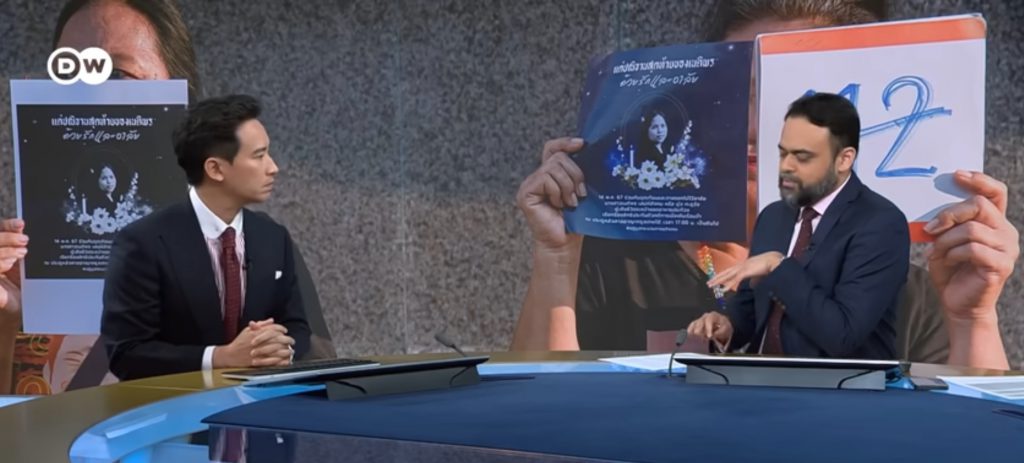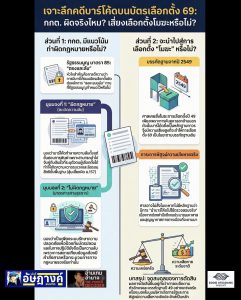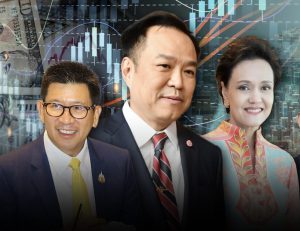
Did Pita give an interview to Germany’s DW news agency with information that is distorted or not based on the facts?
Pita told DW that….
“It’s a tragic loss for Thailand as a nation, where a group of young activists was asking for the rule of law instead of rule by law. Detention before trial happens in Thailand, and that’s what she wanted to fight against. She also fought for the right to bail and the presumption of innocence.
These were the three core issues she was advocating for. Of course, the reform of the lèse-majesté law was a key point from the very beginning.
However, because she was refused the right to bail, many younger generations detained before trial went on hunger strikes.
She is not the only one, and I just feel the pain inside for her family that she had to go through it this way. There should be a way of negotiating or a kind of dialogue that doesn’t have to cost lives.”
………………………………………………………………………….
Let’s seek out the truth together.
Let’s rewind the timeline to February 8, 2022. It all began with Bung Netiporn and her cohorts conducting a survey asking whether the royal motorcade caused inconvenience. The court deemed it “an attack on the royal motorcade aimed at inciting unrest and lawlessness, leading to potential destabilisation within the kingdom, and encouraging citizens to violate territorial laws.”
The royal procession serves as a gesture of security for the monarchy, a practice observed universally where every nation must ensure the security of the monarch’s or president’s procession, as well as important figures of the nation.
In this regard, the prosecution did not object to the temporary release on bail for all eight defendants during the trial, specifying that it was at the discretion of the court.
The court granted bail, with conditions prohibiting engagement in activities similar to those subject to the ongoing legal proceedings, which could potentially undermine the monarchy, incite unrest, or encourage participation in gatherings likely to cause turmoil within the nation.
Following these events, Netiporn was incarcerated twice for violating the terms of her bail by repeating the offense.
On May 3, 2022, Bangkok South Criminal Court issued an order to revoke the bail of Bung, along with other members of the Talaewang group, following their participation in activities to survey opinions twice.
The first instance involved conducting a poll to inquire, “Are you willing to sacrifice your house for the monarchy?” on March 13, 2565, at the Victory Monument.
The second instance involved conducting a poll to inquire, “Do you want to pay taxes to support the monarchy?” on March 31, 2565, at the Skywalk in front of Big C Ratchadamri and Ratchaprasong Intersection.
The court deemed it to be an act similar in nature to the actions that led to the defendants being prosecuted, enticing and inviting the general public to participate in demonstrations, which could potentially cause unrest and instability in society.
On August 4, 2022, Bung received bail after her lawyer filed a bail application more than 8 times, following over 94 days of detention.
On October 19, 2566, Bung was detained for the second time. The court sentenced “Bung Taluewang” to one month in prison for contempt of court and assaulting a court police officer.
The prosecutor revealed that today the court issued an order to revoke the bail of Netiporn or Bung due to their participation in a protest demanding the revocation of the qualifications of members. Evidence emerged in the form of photographs depicting them as individuals involved in spraying paint on high-level symbols.
Therefore, the court deemed it a violation of its authority and sentenced them to one month in prison. Thus, the court’s refusal to grant bail stems from the fact that “the court had previously provided the opportunity for temporary release, but the accused violated the conditions set by the court.”
After being detained in the women’s prison in Bangkok, on January 27, 2024, Bung declared a dry hunger strike until May 14, 2567. In total, she abstained from food for 108 days.
Bung undertook a hunger and water strike as a form of protest, with two demands:
1. Reform of the judicial process.
2. Ensuring that individuals with political dissent are not imprisoned again.
It can be seen that Bung’s and her supporters’ demands for judicial reform is to ensure that individuals with political dissent are not imprisoned again while receiving bail however this is a distortion of reality for political gain.
It should be noted that any person claiming personal rights to defame, insult, harm, or violate the rights of others is universally prohibited. Bung and her supporters have participated in violating this right but claims to use her “personal rights” by defaming and insulting the Monarchy to serve their political agendas.
Therefore, the truth of the matter is that she was not imprisoned for expressing political dissent, and after legal proceedings, she was granted bail like everyone else.
“Article 112 in Thailand, aimed at safeguarding and honoring the monarchy, is not a law that restricts people’s rights to express political opinions. Similar protective legislation exists in other nations for their heads of state. Every country in the world, whether it has a monarch or a president, has laws protecting the head of state.”
The fact is that Bung was not imprisoned for expressing political dissent and, after being prosecuted, she was granted the right to bail like everyone else.
………………………………………………………………………….
Therefore, Pita’s interview with DW, where he claimed that Bung was fighting for three key issues, is a distortion of the facts.
Pita told DW, the German news agency, that….
“It’s a tragic loss for Thailand as a nation, where a group of young activists was asking for the rule of law instead of rule by law.
“What is the difference between the Rule of Law and the Rule by Law?
Rule by Law refers to the use of laws as tools of authoritarian control, applied to oppress others while exempting those in power.
Rule of Law, on the other hand, is the principle that everyone, including those in power, is subject to the same laws, ensuring justice and equality under the law.”
“The rule of law” and “rule by law” are concepts that represent different approaches to governance and the application of laws.
1. The Rule of Law
– This principle means that everyone, including the government, is subject to the law. Laws are clear, publicized, stable, and just, and they are applied evenly. The rule of law ensures that laws protect fundamental rights and are enforced by competent and independent judges.
– Key aspects include fairness, equality before the law, accountability, and the protection of human rights.
– It embodies principles such as legal certainty, transparency, and the right to a fair trial.
2. Rule by Law
– In this concept, the government uses law as a tool to control the population and maintain its power. Laws may be arbitrary, unjust, or applied unevenly, serving the interests of those in power rather than protecting the rights of individuals.
– It often implies that the law is used to justify the actions of the government without ensuring that those actions are fair or just.
– Rule by law can lead to abuse of power, where laws are manipulated or selectively enforced to suppress dissent or political opposition.
**Summary of Differences**
– The Rule of Law: Focuses on justice, equality, and the protection of individual rights, ensuring that laws are applied fairly and justly to all.
– Rule by Law: Focuses on the use of law to control and maintain power, often at the expense of justice, fairness, and individual rights.
However, the Thai government governs the country under a constitution that adheres to the principles of the rule of law, clearly stipulating justice, equality, and the protection of individual rights through fair and just application of the law for everyone.
Pita claims that ‘a group of young activists is calling for the rule of law instead of rule by law.’
They are advocating for judicial reform, arguing that political dissenters should not be imprisoned and should have the right to bail.
In fact, it is the young activists who are not adhering to the law. Their actions are not merely expressions of political dissent, but rather acts of insulting, defaming, and threatening the monarchy, as well as violating the rights of others, which constitute legal offenses.
No country in the world allows individuals to claim personal rights to insult, defame, threaten, and violate the rights of others, especially when it involves breaking laws that protect the head of state.
By giving this interview to a major German media outlet, Pita demonstrates that he and the Move Forward Party align themselves with Bung and her group in deliberately violating the law. They appear to have the intent to undermine and erode the monarchy, ultimately aiming to overthrow the democratic system with the King as the head of state, as previously ruled by the Constitutional Court regarding the Move Forward Party’s election campaign policies.
Eddie Atsadang



